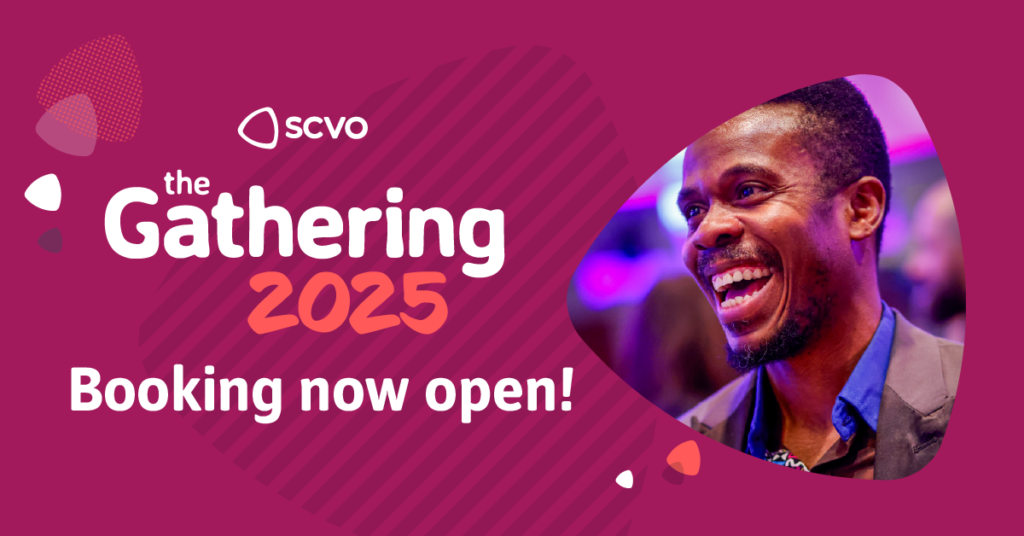We chat to Josie about how writing a book has helped her to express herself and connect with others.
Future Pathways supported Josie to complete and publish her book, ‘Finally Back to My Routes’.
Josie had been writing for years. Writing helped Josie to express herself through some of the most difficult times of her life. Josie never thought anything would come from her writing. This changed when her daughter was diagnosed with breast cancer. Before passing away, Josie’s daughter spoke to Josie about finishing her book. Josie was determined to finish her book for her children.
Accessing her care records helped Josie stitch together the story of her past. Josie also learned that she had a sister she had never met before. Josie and her sister have now been able to meet.
“All of the story was in my records. Everything came flooding out.”
Josie would write for hours. Future Pathways supported Josie to finish and publish her book with the Book Whisperers, a service that provides writing support.
“I surprised myself. It was a brilliant experience. I could get rid of all my anxiety and stress. I would just focus on writing.”
Josie is now a published author. To celebrate, she had a book signing event with family and friends. Writing ‘Finally Back to My Routes,’ allowed Josie to be completely truthful about her past with her loved ones. Her friends and family now know her as someone who is always laughing and joking.
“That old life is gone now. I love my life now. I am in a happier place. I am more ‘me’. And my kids are so proud of me.”
Find out more
Josie’s book is available to buy on Amazon here.
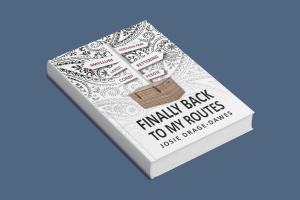
You can also read a longer article about Josie’s support from Future Pathways in the Experiences section of our website.
Creative activities can help us to feel more relaxed and positive. Here, we share more about how creativity can support mental wellbeing.
Taking part in creative activities can be positive. It can help us to socialise and stop us feeling bored. But it can also really help our physical and mental health. Creative activities can:
- Help us to relax
- Reduce anxiety
- Make us feel proud
- Help us feel more positive
- Support us to cope better with stress
Art and creativity can help support mental health. And anyone can give it a go. Here are some ideas:

Draw in the sand
If you live near a beach, you could draw shapes or pictures in the sand. This can help you to relax and clear your mind

Start a picture journal
Journals or diaries do not need to just be words. You can draw pictures instead. This can help us to reflect on the day

Draw outside
Taking a notepad and pencil with you outdoors can help to relax. And it can help you to get in touch with nature or notice things round you.
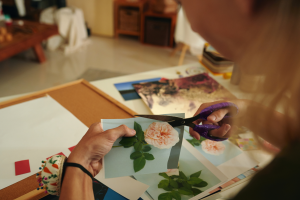
Make a collage
A collage is a picture made of different pieces of paper. You can cut out pictures, colours or words. And you can arrange them any way you like.
Future Pathways has supported people in lots of different creative activities. From drawing and painting to pottery, writing and poetry. You can see more in our dedicated Features section which showcases work created by people we support.
This information and guidance has been produced by the members of Voices for a Better Future. It is to help anyone who is trying to access their records from when they were in care as a child.
Voices for a Better Future is a lived experience voice group. It brings together people who experienced abuse or neglect while they were children in the Scottish care system. Members of the group want to make a difference. They want to help improve services and support for others.
The information is available as a booklet and as an Easy Read version too.
Being There looks at the prevalence of multiple unmet basic needs among people we support. The report also considers the barriers people face when accessing support and how we can help people to navigate these barriers.
Our findings show that many people supported by Future Pathways experience multiple unmet needs. This can include living in areas of high multiple deprivation or facing challenging life experiences such as homelessness. These circumstances can affect engagement with support and the nature of support itself. There are times when support must, by necessity, focus on responding to basic needs rather than working in an outcomes-focused way.
We also see that people with unmet needs face barriers when seeking to access support from other services. People can find it difficult to engage effectively with services that do not flex to individual needs. Experiencing such difficulties with services can result in people being unable to access support or sustain relationships with services. This can compound the very inequalities for which people are seeking support.
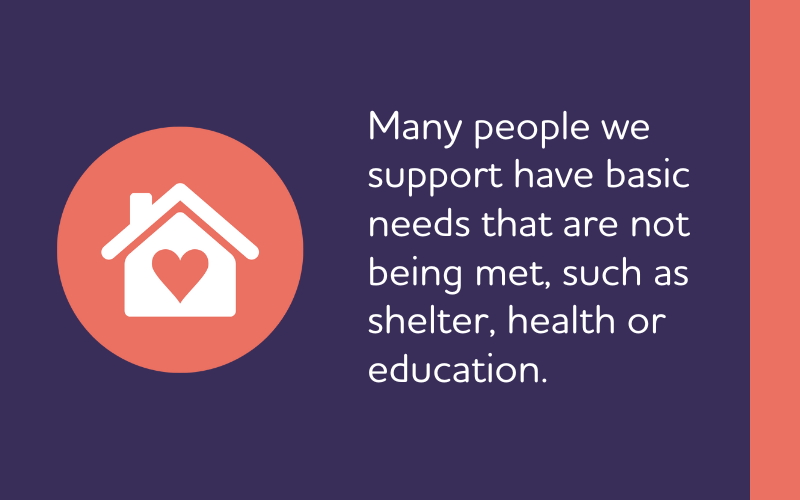

Barriers can erode a person’s sense of autonomy, choice and self-efficacy, leading to feelings of powerlessness, insignificance and worthlessness. For many people, such emotions are associated with previous experiences of abuse and neglect. It is crucial, therefore, that services develop an understanding of the signs, symptoms and impacts of trauma.
At Future Pathways, we find that a trauma-informed approach can effectively respond to the needs and outcomes of people with lived experience who are facing multiple unmet needs. Indeed, our approach can also create a bridge, connecting people to services beyond our own. By building trust, we can support people to engage meaningfully with other services, improve their relationships with those services and have their needs met.

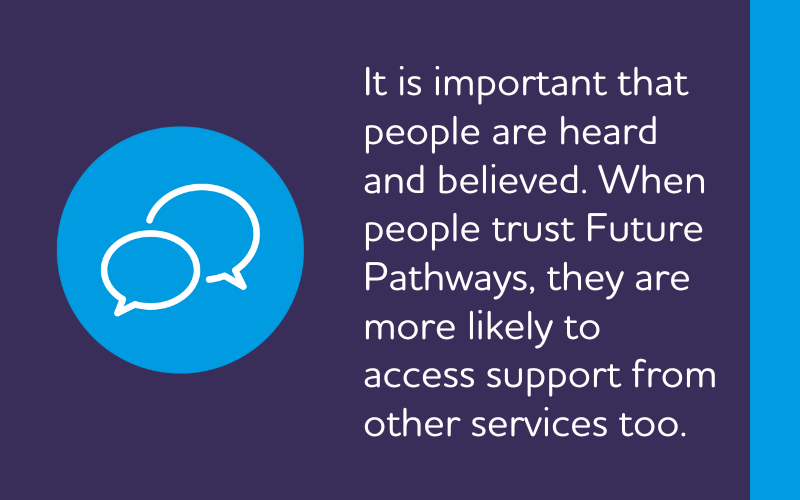
The life experiences and personal outcomes of people supported by Future Pathways are significantly affected when people also experience multiple unmet basic needs. We are committed to learning more about this so that we can improve our service and ensure people can access the support that is right for them.
We also hope that by sharing our learning, we can advocate for positive change across other services. An inclusive, flexible, trauma-informed approach to support is essential if we are to help address the many inequalities experienced by people with lived experience.
Have you worked in partnership with Future Pathways? We want to hear from you.
If you work in the third sector or in a statutory service, we’d like to know what you think of Future Pathways.
At Future Pathways we support people who experienced abuse or neglect as children in Scottish care settings. A big part of the support we offer is helping people to connect and work with existing services, including third sector and statutory services. We connect people with services in a range of ways to help them access the support they need. We:
- Signpost people to support
- Refer people to support
- Support people to engage with services
- Help existing services to work effectively with people we support
We know that supporting people to access services is very important for many people accessing Future Pathways. So, we want to learn more about the true scope of this part of our support. We also want to hear what it is like for services to work with Future Pathways. And we want to hear how you think we could improve.
We know that our collective support can make a real difference. We think that working in partnership with existing services can have important ripple effects for people. For example, we think it might help people build trust with other services. We want to hear what you think about the impact of our work together.
If you have experience of working with Future Pathways, share your views with us. Your feedback helps us improve our service.
Survey runs 27 January to 10 March 2025.
All feedback is anonymous, unless you would like us to contact you about your feedback. You can read more about how we store and use information in our privacy policy on our website.
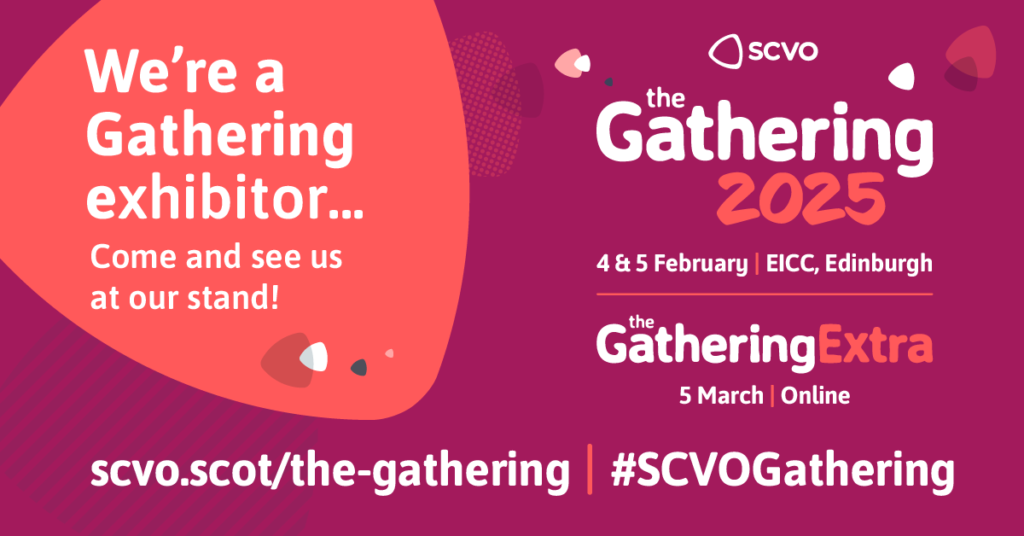
We are looking forward to attending SCVO’s The Gathering 2025. At this year’s event. We will have an exhibitor stand where you can find out more about who we are and what we do, and make connections with staff from across Future Pathways.
Join us at stand 39 on Tuesday 4 February and Wednesday 5 February to discover more.
We are pleased to have the chance to highlight our work and the difference we make. The Gathering is a fantastic opportunity to learn, get inspired and to connect with other services and organisations.
The Gathering is the largest free voluntary sector event in the UK and it is organised by the SCVO (Scottish Council for Voluntary Organisations). This is an opportunity for Future Pathways and many other services to talk about the support we offer. The Gathering will take place at the EICC in Edinburgh on Tuesday 4 February and Wednesday 5 February 2025.
Role model
As I grew up and learnt about right and wrong and life in general it was very important to have a role model. One that I could go to and talk about the laughter and squealing in the playground and loud screaming voices in the classroom. Adding to the worry and the fear in my head.
And then I go home. It’s like trying to pull a grape skin over a tomato. Shouting in my face, Shhht, I want to hear this doesn’t help you socialise. TV and music can become your role model. When there is a lot of pain, fear and living inside your head. It’s dangerous struggling to adapt with friends, worried about fitting in, no one to go home to speak to about it. Walking way a lisp and talking way a limp.
Feeling worthless, no confidence, drugs dig you an early grave, drink burns your life away, makes you lonely and keeps you on the edge from dealing with things, worried about actions and consequences on the outside. Very loud on the inside, it’s like the largest freight train in the world with no driver.
As we go on in life, hold them, don’t hold them down.
As my adult life continues everything intensifies and jumping from pillar to post helps in ways but not the ways that matter. A learner driver needs a pilot.
I’m still inside my head, so confused by the past trauma and decisions that affects me still in day-to-day life. Trains needs a captain.
I’m still trying to forgive and forget. The harsh fact is that only I can keep the smile on my face and hope that my soul finds the mate that holds me. Every plane needs a co-pilot.
Because if I get held down, I will surely drown in a love that’s not real, no matter what I feel.
A ship needs a pirate in stormy waters.
A soul with no mate is a lonely race to face.
HOLD ME, DON’T HOLD ME DOWN
This announcement is sent on behalf of the Scottish Government.
Future Pathways is publicly funded. This means that it is funded by the Scottish Government.
Future Pathways has been running since 2016. When a publicly funded service has been running for a long time, a review takes place. This is to make sure the service is working as well as it should.
A review is now taking place at Future Pathways. You can find out more about the review below.
Who runs Future Pathways?
Future Pathways is delivered by the In Care Survivors Alliance. The Alliance is made up of four organisations. These are:
- Glasgow Psychological Trauma Service (NHS Greater Glasgow and Clyde)
- Health in Mind
- Penumbra Mental Health
- Scottish Government
Why has the Scottish Government asked for a review of Future Pathways?
Scottish Government Ministers asked for this review to understand more about how Future Pathways is working.
Reviews like this are a normal part of checking that a service is operating properly. It is important that Scottish Government reviews the services it funds, to check that services are working well and see if they can be improved.
Who will do the review?
Scottish Government has asked an organisation called BDO to carry out the review. They are a finance and business company.
When will the review happen?
The review started in November 2024. This work is expected to finish in the coming months.
What happens during a review?
BDO will look at two parts of Future Pathways work:
- Governance. This means looking at the decisions Future Pathways make. The In Care Survivors Alliance runs Future Pathways. BDO will look at how the Alliance works and the decisions it makes.
- How Future Pathways supports people – BDO will look at how Future Pathways supports the people that are registered with its service.
When BDO looks at governance and support, they will check:
- how Future Pathways is working
- if Future Pathways processes and systems are working well enough
- if the Scottish Government has been clear with Future Pathways about how the service should work and what the service should do. This will include checking how the service runs, and how Future Pathways uses its funding and resources.
How will BDO do the review?
BDO will look at different types of information from Future Pathways. They will look at impact reports, quarterly reports and Quality Framework reports. They will also look at things like guidance and finances.
BDO will speak to staff from different teams at Future Pathways. They will also speak to the Alliance Leadership Team. The Alliance Leadership Team includes staff from each of the Alliance partners. The Alliance Leadership Team also includes people who have been supported by Future Pathways.
During the review, BDO will share information with Scottish Government. This will help Ministers at the Scottish Government to see how Future Pathways could be improved. And it will help to make sure that the service is working as best as it should.
Will support be affected?
No. Future Pathways will continue working as normal. There will be no changes to support while the review takes place.
Improving the service
If BDO and the Scottish Government decide that Future Pathways could be improved, they will make sure that you can be involved. For example, taking part in discussions about any improvements. Scottish Government will share more information about this after BDO have completed their review and after BDO have shared what they have learned.
If you have questions about the review
If you have any questions about the review itself, you can contact the Scottish Government directly by:
- Emailing: SurvivorFeedback@gov.scot
- Writing to: Trauma, ACEs and Resilience Team, Mental Health Directorate, Area 3ER, St Andrews House, Regent Road, Edinburgh, EH1 3DG
Our latest Quarterly Report is now available to view. It covers our work from July to September 2024. It shows what we’ve learnt, and includes key stats and feedback from those who access Future Pathways.
What happened in Q2
48 people registered with Future Pathways.
25 people started working with a Support Coordinator.
At least 97 people were accessing support from at least 35 Delivery Partners.
Who we supported
The average age of people who registered with us was 49.
80% of people who registered with us live in Scotland’s most populated areas.
How people felt
We received positive feedback from people we support, and we also received suggestions for how we could improve.
People shared that they felt Future Pathways understood and cared about them. Many people also shared that they felt able to trust Future Pathways.
7 out of 7 people who answered our feedback forms feel that Future Pathways understands them and their needs.
People also told us that some experiences, like gaps in contact, could negatively affect their trust in the service.
What people gained
People accessed a mix of different types of support in Q2. Many people told us they feel able to access the support that is right for them.
Many people accessed support from our Delivery Partners, such as record search support, creative therapies and support work.
Many people accessed support through our Discretionary Fund such as support to make their home feel safe and comfortable, and to progress outcomes around health and fitness.
People also accessed support to link up with existing services such as housing and healthcare supports.
What changed for people
People shared what changed in their life after accessing support from Future Pathways. Many people fed back that they know more about their strengths and what they can do. They also told us they feel clearer about the changes they want to make with our support.
5 out of 7 people who answered our feedback forms now know what changes they want to make in their life.
What difference we made
Many people shared the impact of their work with Future Pathways.
5 out of 7 people who answered our feedback forms feel more hopeful about their future.
Some people told us they feel their life is better overall since accessing Future Pathways support.
Our full report features further infographics, feedback and a breakdown of our financial spend.

We asked Bill about his book, and why he decided to tell his story.
Future Pathways supported Bill to write a book about his life. He worked with The Book Whisperers to do this. The Book Whisperers are one of our Delivery Partners.
Bill is from the north of Scotland and speaks in the ‘Doric’ dialect that is common there. The book is written in the same dialect. Even if you’re not familiar with Doric, you can still understand the book. It’s called ‘Tellin’ It Like It Is: ma life on and aff the rails’. Bill chose this title because for many years he worked as a train driver.
Bill had often thought about writing a book and when he said this to his Support Coordinator, she told him about The Book Whisperers. Bill says:
“I thought: ‘Why not?’, so Future Pathways put me in touch with Katie at The Book Whisperers, and it just went from there. I told them what I wanted in the book – my own words. It’s my story.”
Bill met with Katie online, over a few months, to tell his story. He has had an interesting life, starting on a farm in Aberdeenshire.
“I’m 72 now, and I’ve lived a good life. I’m a country boy, born and bred. Born on a farm, and all the kids at school were farmers’ kids. When I was 7 years old I’d take the cows in for milking every morning, and milk them myself. The farming then was a lot different to what it is now. Then it would take 6 or 7 men to run a farm. Now one or two can do it.”
So what inspired Bill to write the book?
“The book is my whole life story, from start to finish. I don’t know what people will like about it – that’s up to them. Everything in the book is God’s honest truth. Nothing made up at all. I’ve never done that in my life, and I’m not going to start now. It’s all in there – including the swear words! I don’t just tell people what they want to hear. I tell it like it is.”
Bill now has quite a lot of serious health problems, but this hasn’t changed his approach to life or his sense of humour.

